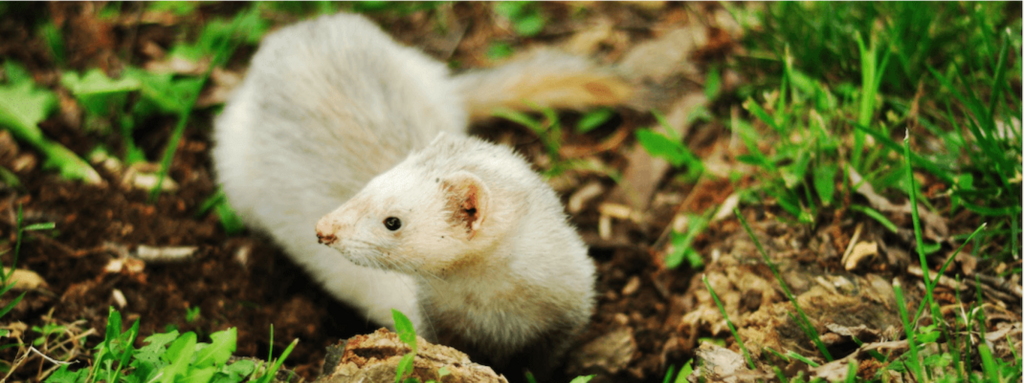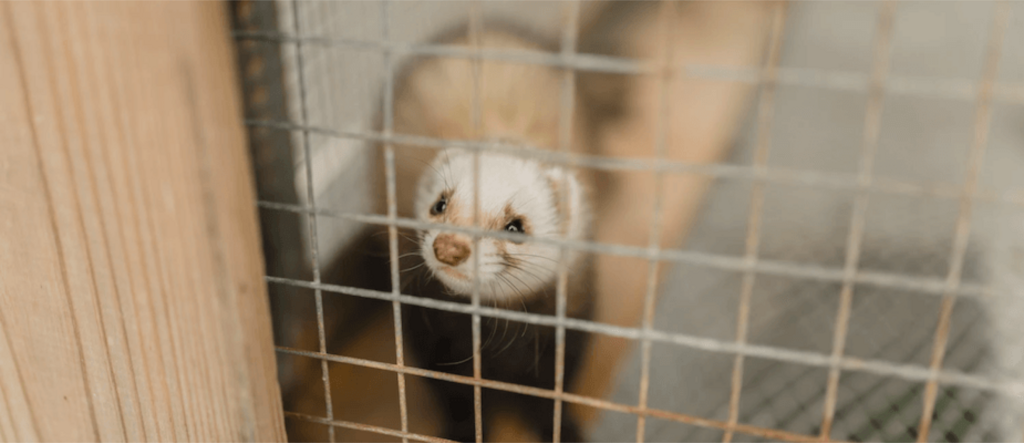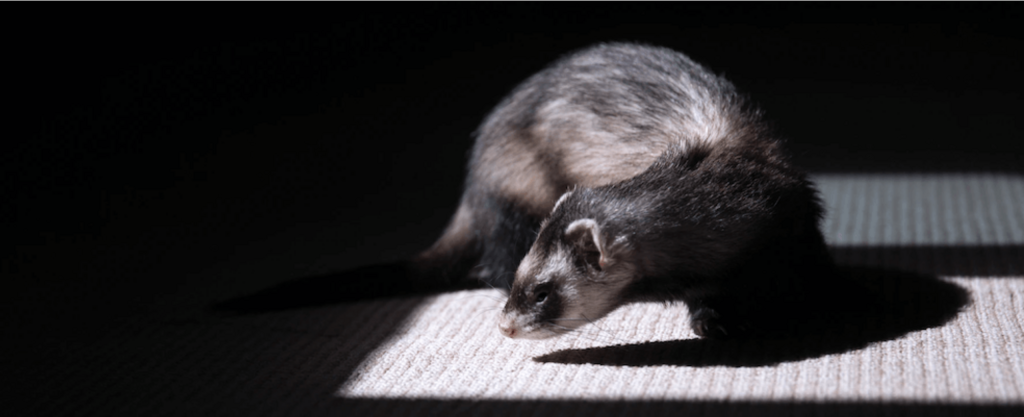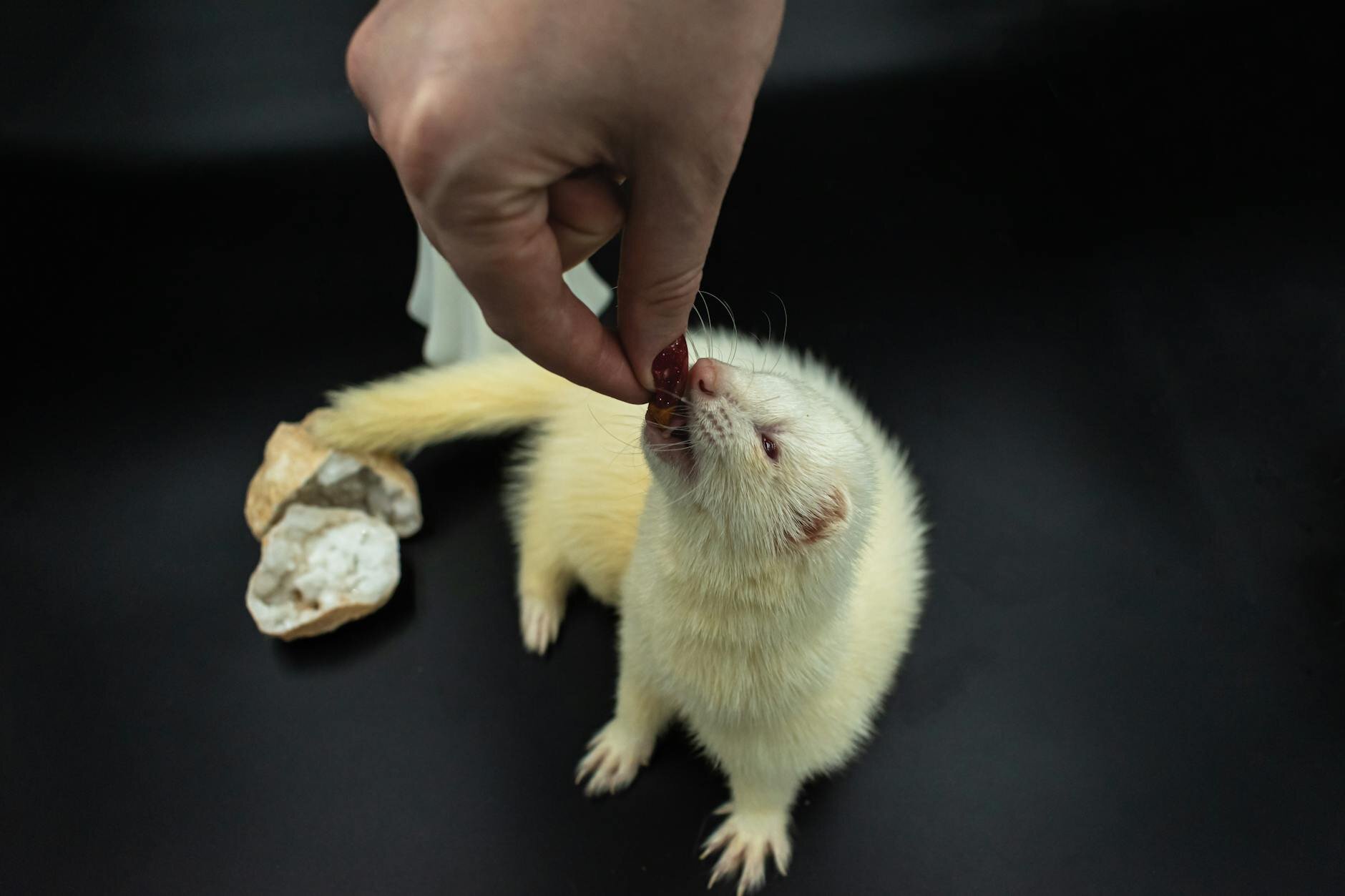Last Updated: 22/12/2025
Ferret Care Guide
Read our comprehensive guide on caring for ferrets including housing, toilet training, feeding, desexing, vaccination and more.
Author: Dr Nicole Wynne BSc BVMS MANZCVS (Unusual Pets)
Reading Time: 14 minutes - short read
Ferrets are quickly becoming a popular pet for people who want a playful, friendly companion that can fit into a small space. Their adorable little faces and quirky personalities often get people hooked on ferrets for life! However, they still require personalised care and may not be a good fit for all households. Keep reading to find out if a ferret or two is right for you!
In this article
- Is a ferret for you?
- How to find a good ferret breeder or rescue
- What kind of housing is suitable for a ferret?
- What should you get before your ferret arrives?
- Can ferrets be toilet trained?
- What kind of bedding and litter should I use for my ferret?
- What is a normal ferret daily routine like?
- What to feed your ferret
- How much to feed a ferret
- What foods are dangerous for my ferret?
- What worming and parasite prevention do ferrets need?
- Should I microchip my ferret?
- What kind of vaccination does my ferret need?
- Should I desex my ferret?
- What is involved with ferret desexing?
- When does my ferret need to see the vet?
- How can I maintain my ferret's dental health?
- Can I give my ferret a bath?
Is a ferret for you?

Ferrets are incredibly charming little animals, but they have some requirements that may make them unsuitable for some households. They are unbelievably energetic for up to 6 hours a day, and require a lot of environmental enrichment. They are also very fast and great at getting into tiny spaces or getting lost, and may not be suitable for a home with lots of potential escape points.
They are also obligate carnivores and have a strong prey drive, and so should not be kept in homes with small herbivores such as rabbits, rats, mice, or guinea pigs. Ferrets can also be quite nippy, and even tame ferrets will sometimes nip hard enough to bruise or draw blood, and so they are not suitable pets for young children.
Ferrets will also have a distinctive odour that persists with less intensity after they are desexed. Finally, they can live for up to 10-12 years, and will often need more specialised veterinary care, especially as they get older.
How to find a good ferret breeder or rescue

There are plenty of ferret rescues in Australia, and many rescues are associated with the state's ferret club or association. These associations often take in and re-home abandoned ferrets, and many members will breed one or two litters a year. There are also dedicated ferret rescues that focus on only rehoming abandoned or unwanted ferrets. A well-run rescue will often foster out their ferrets in private homes, and will ask you a list of questions and try to match you with a ferret that best suits your home and lifestyle. If you want to get your ferret from a breeder, visit the facility and ask to view the breeding animals before you make a decision. The adults should be healthy, alert, and curious to see a visitor. They should also be housed appropriately, with females living in small groups, and males living alone or with one other individual. Do ask if their breeding stock are all up to date on vaccinations and parasite prevention.
What kind of housing is suitable for a ferret?

Keeping your ferret caged at all times is not considered ethical or humane. Always ensure your ferret has ample time out of their enclosure and they should have at least 2 hours a day of supervised free range exercise and play.
Ferrets can be kept free roaming indoors - just like house cats! But do be aware that they should be supervised when outside of their enclosure, as they are notorious for eating little objects like foam earplugs!
FERRET FACT: One of the most common surgeries for ferrets is gastrointestinal foreign body removal, due to their habbit of eating small inedible objects! This is particularly common with foam ear plugs, hairbands, rubber objects and other small items. Always keep your ferret area clear of small swallowable items, and remember to supervise!
Most people prefer to keep a large, multi-storey cage as a 'safe space' for sleeping and security. This can help keep them out of trouble when you're not home, and provides a comfortable home for a sense of security and routine. Ferrets love to climb and hide away, and their cage can be furnished with hammocks, tunnels, beds, and hidey holes.
Outdoor enclosures and activity courses can also be great for ferrets. It's essential that such enclosures are escape proof, predator proof and protected from harsh weather.
Many ferrets can also be harness trained and this can be a way to safely take them outdoors into an enlcosed safe space like a backyard. Alternatively, ferrets can also enjoy the outdoors from the safety of an enclosed pet pram.
What to put in your ferret's safe area: Even for ferrets that are housed in a cage, you should still allow them to roam out of their cage in a safe area for at least 2-4 hours per day. In this area, you should provide:
- Water in bowls, not drinker bottles, and ensure that the bowls are solid and can't be tipped over. Ceramic bowls work well. A small, non-slip and solid food dish should also be provided.
- Toilet areas. A small cat litterbox can be placed in a corner on the ground level, as that is where your ferret will most likely want to go to the toilet. Providing multiple litter trays is beneficial, especially for multiple ferrets. Recycled paper litter such as Scrunch and Sticks is a good option for ferrets.
- Toys. We recommend using food puzzle toys to feed ferrets as it helps their active little minds, and the Kong Cat Toy, Kong Cat Puzzlement Pockets, and AFP Cat Treat Maze are great options for ferrets.
Does my ferret need a friend?
Ferrets are social animals so it is always best to house ferrets in pairs or small same-sex groups. Ferrets that are desexed will get along best and be less likely to fight.
Ferrets have been known to get a long with cats and dogs in the same household but careful monitoring and close supervision is necessary to ensure that nobody gets hurt.
What should you get before your ferret arrives?
What do I need to buy for a ferret? Have your ferret's cage set up and ready to go before they arrive, and give them a couple of days to settle in and figure out their routine before making any changes to their cage or diet. Ensure that you have a small amount of the food they were on, and a bag of ferret kibble and whole prey/raw meat in the freezer. They should be slowly transitioned to their new diet over a week to prevent stomach upsets.
Can ferrets be toilet trained?

They can! They will not be as good as cats at using a litter tray, but will do most of their toileting in it. They prefer to go to the toilet in corners, and you can place multiple litterboxes in corners until they reliably go to a litterbox to toilet, then slowly reduce the number.
What kind of bedding and litter should I use for my ferret?
Recycled paper cat litter is a great option for ferrets, and is safe if they chew and ingest any of it. Blankets, mats, and beds are the best options for lining their cage, as they will kick loose bedding such as wood shavings out of the cage. Ferrets also love to burrow under towels and blankets and snuggle up in fleecy hammocks and igloos.
What is a normal ferret daily routine like?

Ferrets are most active during dawn and dusk, and will benefit most from having supervised free roam time in the morning or evening. Ferrets will usually sleep deeply from the late morning to early afternoon and it's not unusual for ferrets to sleep for 20-22 hours a day but the hours they are awake, expect them to be very active and playful!
Ferrets can eat at any time of the day, but will normally prefer to have larger meals in the evening. Ferrets normally toilet during dawn and dusk, but may also toilet when they are nervous.
What to feed your ferret
There are a few options for feeding ferrets, and there are several schools of thought amongst the ferret community as to what ferrets should be fed. Ferrets are obligate carnivores like cats, which means that they have evolved to only be able to eat meat. A common misconception is that ferrets should only be fed raw meat products like raw mince and this frequently leads to nutritional deficiencies and health problems like metabolic bone disease, as ferrets have evolved to eat whole prey.
A whole prey animal consists of 60-70% organ meats, and only 30-40% muscle meat, not to mention bone, skin, and fur. Furthermore, many vitamins and minerals such as vitamin A and calcium are not stored within muscle meat, and exist in much higher levels in organ meats. We also recommend that ferrets get a whole prey item such as a mouse or a day old chick at least two to three times a week, regardless of whether they are fed kibble or raw meat as the main source of nutrition.
Whilst, a primarily whole-prey item diet is the optimal diet for ferrets. Feeding this as the sole diet or at all to some ferrets may not be possible. For example in households where there are immunocompromised individuals or small children, raw meat can be risky. Furthermore, as ferrets imprint on their food when they are kittens it can be tricky to get them to eat whole prey items unless they have been introduced at a young age. This is why it is ideal to feed juvenile ferrets to food sources with a range of different tastes and textures.
A raw meat diet is certainly possible, as long as only 40% of the diet consists of muscle meat such as chicken breast, thighs, beef pieces, or lamb. Mince falls under the "muscle meat" category. The remainder of the diet should consist of organs such as hearts, kidneys, livers, lungs, and tripe from chicken, beef, and lamb, and a small amount of bony meat for the calcium content, as well as maintaining dental health. Raw bones such as chicken necks, chicken wings and frames can also be fed to ferrets for calcium and to help with dental health but monitor your ferret closely to ensure the bones are not splintering or too tough on their teeth and discard of uneaten bones.
Kibble can be fed as the main diet supplemented with either whole prey items with or some raw muscle and organ meats added in. Just remember to adjust the feeding portions accordingly if you are mixed feeding. The most important thing when it comes to feeding ferrets kibble is to ensure that it meets the ferrets high protein (30-40%), high fat (15-40%) and low carbohydrate (< 25%) requirements.
There are a few ferret specific diets such as Pet Pacific, but you can also feed a high quality kitten or cat food such as Ziwi Peak and Orijen. Stay away from lower quality brands as they may not meet the high nutritional requirements of ferrets.
How much to feed a ferret
Daily metabolisable energy intakes for ferrets have been estimated to range from 200 to 300 calories (kcals) per kilogram body weight per day. Ferrets should have food available at all times due to their fast metabolisms. If your ferret is overweight, do work with your vet to come up with a safe and healthy weight loss plan. Food puzzle toys or slow-dispense feeders are a great way of ensuring they always have something to eat, but don't overindulge.
My top slow-dispense feeder recommendations include:
- The Kong Cat Wobbler
- The Catit Senses Food Maze
What foods are dangerous for my ferret?
Ferrets should not be given fruit, vegetables, or cereals. Spoiled, smoked, or cured meats should also be avoided. Ferrets cannot digest cheese or other milk products.
What worming and parasite prevention do ferrets need?
Ferrets can get heartworm, and so should be treated with a preventative once a month. Revolution or Revolution Plus is safe for use in ferrets, easy to administer, and effective.
Revolution Plus will prevent fleas, ticks, and mites. Drontal can be used once every 3 months to cover against tapeworms. This is especially important if your ferret is being fed raw meat.
Should I microchip my ferret?
Yes! Microchips are a permanent method of identification, and ferrets don't do well with collars. Ferrets are fast and can squeeze through very small gaps, and so are more likely to get lost, and it is very difficult to reunite found ferrets with their owners without some form of identification. Ferrets can be microchipped at any time, or when they are under anaesthesia for desexing.
What kind of vaccination does my ferret need?
Ferrets should be vaccinated yearly against distemper (canine distemper virus), which is a viral disease that causes neurological, skin, ocular, and respiratory symptoms, and is often fatal. Ferrets should be vaccinated once a year.
Should I desex my ferret?
We recommend that all pet ferrets should be desexed, and some rescue and breeders will not adopt out non-desexed animals. There are several reasons for this:
The benefits of desexing ferrets include:
- Preventing accidental litters
- Reducing aggressive behavior
- Reducing the likelihood of escape - non-desexed ferrets will have a higher drive to escape and roam to find mates
- Reducing odour - non-desexed ferrets have a higher concentration of glands that produce ferret odour, and will smell much more strongly than desexed ferrets.
- Preventing oestrogen toxicity anaemia - female ferrets are induced ovulators, which means that they will stay in oestrus and have a high level of circulating oestrogen until ovulation is induced when they are mated. If they are not mated, the high levels of oestrogen in their blood suppress red blood cell production and they will eventually become anaemic. If untreated, it can be fatal.
What is involved with ferret desexing?
Both male and female ferrets will require a full general anaesthetic to be surgically desexed. There is always some level of risk with any general anaesthetic and surgical procedure, human or animal, so no procedure is ever completely risk-free, but ferrets tend to tolerate anaesthetics and surgical procedures well, particularly if they are young and healthy and typically the risk is very low.
Male ferrets undergo a quick and minimally invasive procedure where the testicles are removed via two small incisions in the scrotum. Most boys don't notice a thing and often get right back to their usual routine once they've recovered from the anaesthetic.
Female ferrets need to have an incision made into the abdomen to remove their ovaries and uterus. This makes the procedure and recovery time a little longer than for males, but most girls are back to their normal business within 2-3 days of the procedure.
Are there any other options apart from surgical desexing?
Yes! You may have heard of concerns regarding adrenal disease in ferrets that are desexed too early. This is more common in the United States where ferrets are desexed very young (usually about 6 weeks of age) before going to pet stores. To reduce the risk of adrenal disease occurring, we recommend that ferrets should be no younger than 6 months of age when they are desexed.
Another option you may have heard of is chemical desexing using in implant called Suprelorin. This implant slowly releases a hormone blocker called deslorelin acetate over at least 12 months, and tricks the body into thinking it is not producing any reproductive hormones. As it is only temporary, your ferret will need to have repeat implants at least once a year, which will add up to more than the cost of a desexing surgery over the lifetime of your ferret. However, it has the added benefit of being an effective preventative and treatment for adrenal disease.
One popular option is to use a Suprelorin implant at 6-9 months then surgically desex your ferret at 18 months of age to reduce the risk of adrenal disease.
Most ferrets will need a short sedation or an anaesthetic to place the large implant as it is quite a large needle, and can be painful. Studies show that the risk of ferrets developing adrenal disease may be lower when implanted than when surgically desexed; however the link is still unclear at this stage.
There is no right and wrong when it comes to surgical vs chemical desexing of ferrets. The decision is made on. an individual basis and ultimately depends on a number of factors. You can always discuss the pros and cons of each method further with your veterinarian and help decide which method is going to be best for your ferret.
When does my ferret need to see the vet?

You should organise a vet visit for your ferret shortly after he or she comes home, and your vet can sort out vaccinations with you, and give your new friend a thorough checkup. Your ferret will need vaccinations once a year, and so will need a vet visit at least once a year, but it is a good idea to get a full checkup once every 6 months to ensure that any problems are caught as early as possible.
How can I maintain my ferret's dental health?
How to keep your ferret's teeth clean?
Your vet will check your ferret's teeth and gums at each visit and recommend dental scaling if needed.
Your ferret should get a small piece of bony meat such as chicken necks once a day to help reduce tartar formation if they are being fed primarily raw meat.
Greenies Cat Dental Treats can be given to ferrets once a day to help reduce tartar formation. Alternatively, toothbrushing is a great method of maintaining dental health.
Can I give my ferret a bath?
Yes! Ferrets are natural swimmers and often enjoy playing in water. They can be messy eaters as well. Ferrets can be bathed as often as once a week. Bathing can help to reduce the ferret odour, but it will not go away completely.
What is the best ferret shampoo? A gentle pet shampoo such as Aloveen is suitable for ferrets.
History
Our experts continually monitor the health and wellness space and we update our articles when new information becomes available.
Mon Oct 13 2025
Edited by Dr Olivia Clarke BSc BVMS MANZCVS (Unusual Pets, Avian)Medically reviewed by Dr Olivia Clarke BSc BVMS MANZCVS (Unusual Pets, Avian)Dr Nicole Wynne BSc BVMS MANZCVS (Unusual Pets)
Veterinarian, MANZCVS (Unusual Pets)
Dr. Nicole graduated from Murdoch University in WA in 2014, and immediately started working in exotics-only practice. She was also one of the few vets in Australia that would routinely see venomous snakes ranging from death adders to tiger snakes. Although Dr. Nicole enjoys seeing all exotic pets, her absolute favourite are rabbits. She passed her Australian and New Zealand College of Veterinary Scientists Membership (MANZCVS) exam in unusual and exotic pets in 2021.

